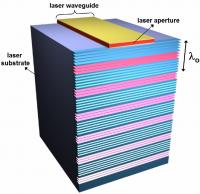Aug 10 2010
Researchers from the University of Leeds and the Harvard University have developed an innovative THz (Terahertz) semiconductor laser that produces laser beams with smaller divergence compared to traditional Terahertz laser sources. This advancement paves way for a number of applications in THz technology and science. The Harvard University has filed a patent for this semiconductor laser.
The research team included Vinton Hayes, Senior Research Fellow in Electrical Engineering, Robert L. Wallace, Professor of Applied Physics, Federico Capasso and Nanfang Yu, postdoctoral fellows, and a team spearheaded by Edmund Linfield.
 Harvard university Metamaterial patterns
Harvard university Metamaterial patterns
The THz rays can easily penetrate plastic, clothing and paper and make them suitable for detecting imaging tumors, biological agents and hidden weapons without causing any dangerous side effects. The THz rays can also detect cracks inside the materials.
The research team created a range of grooves called metamaterial on the surface of the quantum cascade lasers. The metamaterials produced a 3 THx frequency in the invisible portion of the spectrum, the far-infrared.
The artificial metamaterials may find their applications in high-resolution imaging, negative refraction and cloaking, but these materials offer limited scope in semiconductor components.
Federico Capasso stated that the current generation of THz semiconductor lasers are not ideal for detecting biological agents and concealed weapons as the laser beam has a larger divergence. He added that the research team developed an artificial optical structure on the laser’s surface, which enabled them to create highly collimated rays from the semiconductor device.
Source: http://www.harvard.edu